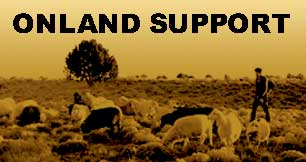The Spring Survival Gathering
May 7, 2004 by pathfinder
Filed under Voices from the Land
(In the following report, “Hopi Tribe” refers to a tribal government imposed by the United States over the objections of traditional Hopi, and still opposed by many Hopis who support those Dineh facing relocation.)
In the tradition of resistance to relocation, a Spring Survival Gathering was held in honor of the late Roberta Blackgoat, resistance leader and traditional matriarch, on her ancestral land at Big Mountain, just a few miles as the crow flies south of the Peabody Black Mesa coal mine.
Driving over 26 miles of dirt road, up and down steep canyons, across sandy washes, through a green desert bright with flowers and swept by spring winds, it’s easy to forget that water is in crisis throughout the southwest. Many wells at Big Mountain and in nearby Hopi villages have run dry, which people of both tribes believe is due to the depletion of the ancient Navajo aquifer which underlies Black Mesa, a depletion caused by coal slurry lines which drain 5 million gallons of water a day from the aquifer.
The nearby Colorado River has itself been taxed to the limit by demands from such burgeoning cities as Phoenix, Las Vegas, and Los Angeles, an uncontrolled growth spurred by investors and developers, supported in part by coal mined from the Black Mesa, and threatening millions of people with drought and other consequences of non-viability.
The gathering was treated with hostility by the Hopi tribal government, and visited daily by armed Hopi Rangers accompanied on one occasion by the FBI. In addition, non-signers of the Accommodation Agreement still living on Hopi Partitioned Lands were visited at their homes by Hopi Field Monitors and questioned about the gathering.
This hostile police presence is a fact of life on the HPL, part of a strategy to drive traditional Dineh (Navajo) from lands awarded to the Hopi Tribe under a 1974 law (PL 93-531) passed by an ill-informed Congress at the behest of Peabody Coal Company.
People living on the wrong side of the line which Congress drew in 1974, both signers and non-signers of the Accommodation Agreement, face a bewildering array of government and bureaucratic forces. A woman at the gathering who lives near the coal mine expressed her frustrations. After obtaining approval from her Navajo chapter house to fund winterization of her mother’s home which has a leaking floor and roof, she was then told “if we go and fund that, we’re afraid the Hopi Tribe will come and file a lawsuit.” Thus far, no repairs.
She has made countless requests to the Hopi Tribe for electricity, easily shunted from nearby coal mine wires. The same hostile tribal government has for 10 years also ignored her requests to gravel her road or repair her dams, and has arbitrarily withheld essential firewood permits.
To gather wood from their own backyards. HPL residents must travel 50 or more miles to apply for permits, and every month a new permit is required. Permits aren’t granted automatically. Non-signers in particular face delays and indifference. Failure to produce a permit at the demand of Rangers or Range Monitors can result in confiscation of firewood and/or chainsaws.
Any new construction on the HPL must be approved by the Hopi Tribe or is subject to removal. One resister testified at the gathering that he was forced to abandon his house when it became unlivable after Hopi Rangers punched through the foundation attempting to arrest supporters who had non-violently blocked a bulldozer threatening the house. Since his house was located near Hopi cattle grazing land, and he himself was the object of close police scrutiny, he despaired of making the necessary repairs covertly, or of being granted a permit.
And, of course, livestock confiscation, based on arbitrary quotas imposed by the Hopi Tribe, remains a constant threat aimed at the heart of HPL residents’ ability to survive. One day, as one of the Rangers who had come to check on the gathering turned to depart, Pauline Whitesinger, elder and longtime leader of the resistance, yelled after him: “Bring some meat next time. You guys have confiscated enough!”
It was a small gathering, reflective of the distances supporters and local residents had to travel, reflecting as well a certain weariness that has settled in many hearts since the destruction of the Sundance arbor by Hopi bulldozers in August, 2001, and also reflecting some disunity that has been fostered and exacerbated by the pressures of trying to live and raise families in the harsh conditions of an occupied territory.
At one point in the meeting, some of the elders were having trouble deciding on a site for the next meeting and, after banging their heads together for awhile, sisters Catherine Smith and Pauline Whitesinger, with laughter in their twinkiling eyes, pleaded with Danny Blackgoat who was hosting the gathering that they didn’t want to be leaders anymore, that it was time for the elders to pass on the mantle of leadership onto the next generation.
That moment, poignant and whimsical at the same time, revealed what a crucible this gathering was. Here, on occupied territory, under clouds which threaten all of us, were gathered youth and elders whose very existence on their ancestral lands is an act of resistance, and supporters who had travelled for a brief visit from as far away as France, as well as those who have spent years on the land serving the resistance, some even having learned to speak the difficult Dineh language. Together we were able to laugh, and look through the clouds to distant stars, understanding that we have no choice but to apply ourselves to our common resistance with all the forces of our being, for the sake of future generations.
We laughed together, prayed together, ploughed the land together, herded sheep together, cooked together, ate together, and confronted intruders together.
On Thursday Catherine Smith, who is half deaf, wearing sunglasses after an operation for cataracts, told us that two Hopi Rangers had come to her house that morning to ask about the gathering. “I think they are checking every home,” she said. “Yesterday I lost my other ear, so it’s good that the Rangers were talking to me today, because I couldn’t hear them.”
The next day, an FBI agent drove up accompanied by three Hopi Rangers in two cars. He was wearing a bulletproof vest. When Danny Blackgoat, seated on a wooden bench, refused to talk with him privately, he was forced to address our host while standing in the center of a circle of twenty or thirty people, cameras and tape recorders buzzing.
“The reason I’m here is because we’ve had an allegation that a bunch of non-Indians are squatting on Hopi land,” he began. “The reason we’re involved is because the Hopis would have a problem evicting non-Indians.”
He proceeded to fire off questions to our host with cavalier disrespect: “How old are you? Do you have a house here? Do you have a census number?” Danny Blackgoat sat with his hands folded above his head, staring him in the eye, answering with amazing deference and respect. There was a deep anguish visible in his face and in the crowd, that such a violation could occur here at his ancestral home where he was raised, thirty years after his struggle for the land was launched, and just over a year since the passing of his mother, Roberta Blackgoat.
“Are You Hopi? Navajo?”
“What nationality are you?” he asked the agent slowly.
“I’m pretty much Illinois redneck, a little bit of everything. Cherokee, Irish, German, whatever happened to be there at the time,” was the flip reply.
For an agonizing twenty minutes, with great dignity, he politely fielded a volley of impertinent questions. Finally Pauline Whitesinger spoke up, addressing the FBI agent. Danny Blackgoat translated:
“She says you look like a Navajo, not a Hopi. She says bring a traditional Hopi with you if you’re going to come here again. She says you’re a white person. So is this person you’re with, and that and that. None of you are Hopi leaders. If they come and tell me this is their land, then i’ll listen to them. This land, the Hopis don’t want it. I’ve been conversing with a Hopi who says we don’t want this land here. It was taken for no reason.”
“Does she have a question?” the agent interrupted.
After a pause, Pauline gazed at him.
“As to what you say, that there are some non-Indians squatting here, I want to tell you that there’s been non-Indians squatting on Native American lands since 1492. And your rent is due. So stop harassing us. This is our land.”
(Special thanks to Danny Blackgoat and Bahe Katenay for their patience, humor, generosity, and wisdom.)


